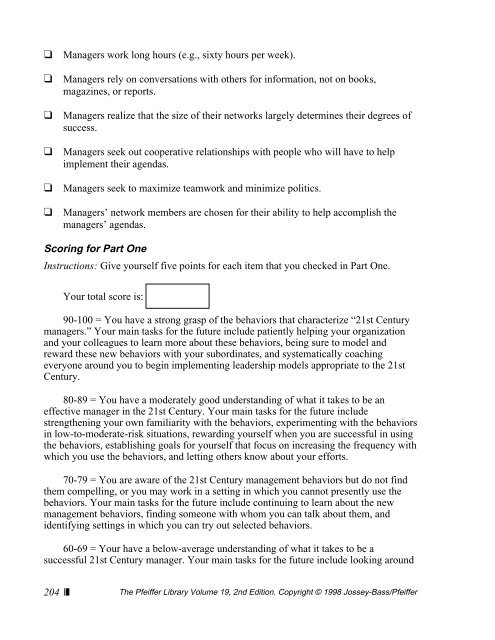motivational analysis of organizations
motivational analysis of organizations
motivational analysis of organizations
Create successful ePaper yourself
Turn your PDF publications into a flip-book with our unique Google optimized e-Paper software.
❑ Managers work long hours (e.g., sixty hours per week).<br />
❑ Managers rely on conversations with others for information, not on books,<br />
magazines, or reports.<br />
❑ Managers realize that the size <strong>of</strong> their networks largely determines their degrees <strong>of</strong><br />
success.<br />
❑ Managers seek out cooperative relationships with people who will have to help<br />
implement their agendas.<br />
❑ Managers seek to maximize teamwork and minimize politics.<br />
❑ Managers’ network members are chosen for their ability to help accomplish the<br />
managers’ agendas.<br />
Scoring for Part One<br />
Instructions: Give yourself five points for each item that you checked in Part One.<br />
204 ❘❚<br />
Your total score is:<br />
90-100 = You have a strong grasp <strong>of</strong> the behaviors that characterize “21st Century<br />
managers.” Your main tasks for the future include patiently helping your organization<br />
and your colleagues to learn more about these behaviors, being sure to model and<br />
reward these new behaviors with your subordinates, and systematically coaching<br />
everyone around you to begin implementing leadership models appropriate to the 21st<br />
Century.<br />
80-89 = You have a moderately good understanding <strong>of</strong> what it takes to be an<br />
effective manager in the 21st Century. Your main tasks for the future include<br />
strengthening your own familiarity with the behaviors, experimenting with the behaviors<br />
in low-to-moderate-risk situations, rewarding yourself when you are successful in using<br />
the behaviors, establishing goals for yourself that focus on increasing the frequency with<br />
which you use the behaviors, and letting others know about your efforts.<br />
70-79 = You are aware <strong>of</strong> the 21st Century management behaviors but do not find<br />
them compelling, or you may work in a setting in which you cannot presently use the<br />
behaviors. Your main tasks for the future include continuing to learn about the new<br />
management behaviors, finding someone with whom you can talk about them, and<br />
identifying settings in which you can try out selected behaviors.<br />
60-69 = Your have a below-average understanding <strong>of</strong> what it takes to be a<br />
successful 21st Century manager. Your main tasks for the future include looking around<br />
The Pfeiffer Library Volume 19, 2nd Edition. Copyright © 1998 Jossey-Bass/Pfeiffer

















